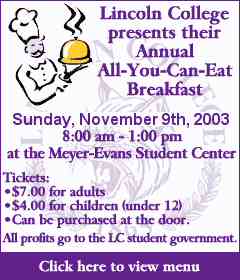|
State Sen. Larry Bomke, R-Springfield,
chaired the first of several hearings on the subject, which heard
testimony from transportation and economic development experts, area
businesses, farmers, contractors, and other groups impacted by road
fund diversions that were approved by the Democrat-controlled
General Assembly in the fiscal 2004 budget.

"This hearing confirmed that road fund
diversions are already taking their impact on the Illinois economy,"
said Bomke, who opposed the diversion in the fiscal 2004 budget. "We
heard testimony from businesses, unions and the construction
industry that the diversion impacts jobs. We heard from the chamber
that the diversion impacts Illinois' ability to attract new jobs and
new business to the state and will worsen our economy. It also hurts
farmers and consumers -- everyone who travels on Illinois highways."

Among those testifying Wednesday were
the Illinois Asphalt Pavement Association, Dot Foods Inc., Illinois
Association of Aggregate Producers, Illinois Farm Bureau, Associated
General Contractors of Illinois, Illinois Operating Engineers,
Greater Springfield Chamber of Commerce, Maclair Asphalt Company,
Illinois Road and Transportation Builders Association, and the
Mid-West Truckers Association Inc.
A common theme in the testimony was
that diversions from the road fund reduce the amount being spent on
improving Illinois roads and easing traffic congestion. This impacts
the safety of people traveling these roads, the impact on their
vehicles, the cost to businesses that rely on highway
transportation, jobs in road construction and trucking industries,
office and factory positions in those industries and others that
rely on shipping in Illinois, and the number of new jobs that could
come into Illinois if the transportation systems are in top shape.
[to top of second column in
this article] |

According to Marvin Traylor with the
Illinois Asphalt Pavement Association, the amount currently diverted
from the road fund for other purposes and the loss of bonding
authority at the end of the current fiscal year is equal to the
state motor fuel tax, or 19 cents per gallon.
Already Material Service Corporation
will close its Cook County site in 2004. Dot Foods is siting new
locations for a distribution center out of state, and while it will
not close its Mount Sterling office, the company could easily decide
to cover 10 of the 30 states currently serviced by the Illinois
facility from the new location if costs to operate in Illinois
continue to climb.

For farmers and consumers, the impact
could be felt in the wear and tear on vehicles as they travel roads
in need of repair. Mike Zahn with the Illinois Operating Engineers
estimated that roads in need of repair cost drivers an average of
$225 per year in auto repairs.
Mike Boor with the Greater Springfield
Chamber of Commerce and Monte Docter with Maclair Asphalt Company
each asserted that the recent diversions will only exacerbate the
problems in Illinois' economy. Good transportation systems help
attract jobs, and Illinois needs to maintain and improve its
highways to remain competitive.
Sen. Bomke is already co-sponsoring new
legislation to return the money the Democrat-controlled General
Assembly diverted from the road fund in the fiscal 2004 budget. That
legislation will be introduced during the fall veto session.
"Diverting money from our highway
systems hurts Illinois' economy as well as our roads," said Bomke.
"I hope these hearings will draw attention to the damage that has
already been done so that we can rectify this situation and turn it
around before the problems worsen."
State Reps.
Raymond Poe, R-Williamsville, and Rich Brauer, R-Petersburg, and
state Sen. Dale Righter, R-Mattoon, also attended the hearing.
Subsequent hearings will be scheduled around the state throughout
the fall.
[News release]
 |